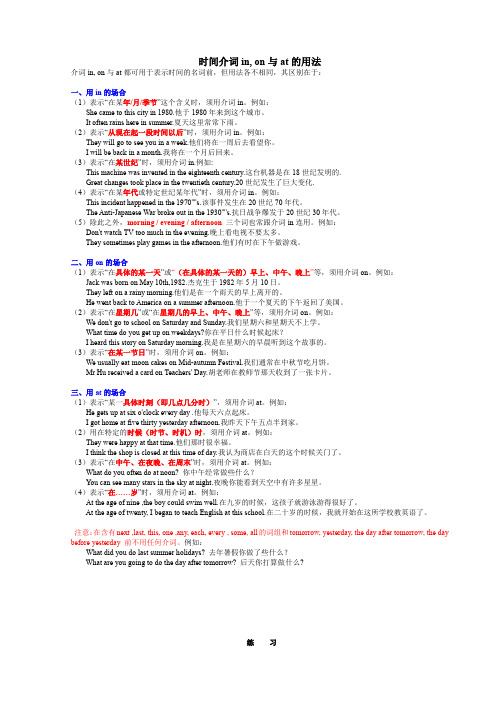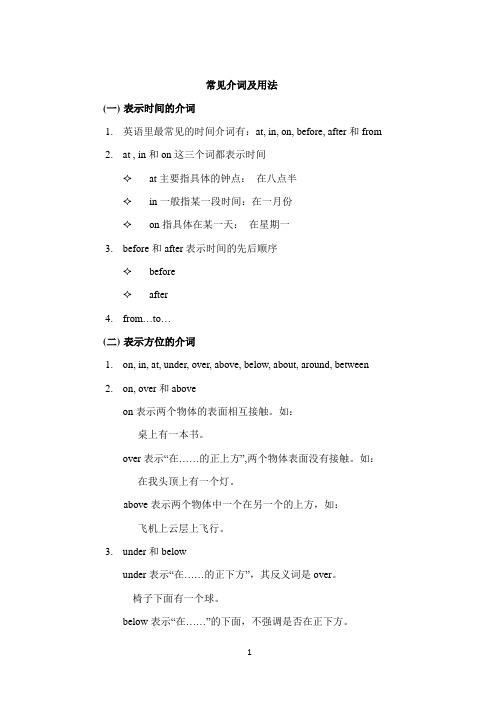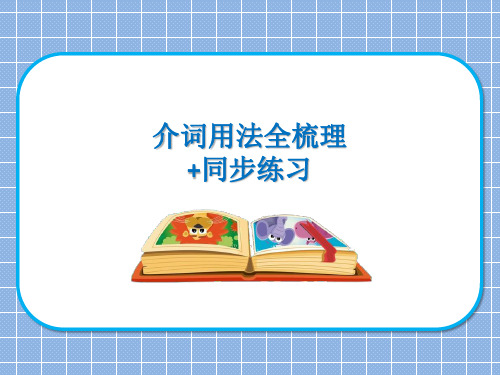小学英语介词讲解与练习
小学英语英语介词及答案含答案

小学英语英语介词及答案含答案一、选择题Xinjiang cotton is praised the best cotton in the country its high quality.A. for; asB. for; byC. as; forD. by; forMy family get together and have a big dinner Sundays.A.atB. inC. onD.toThe 20th China JiangningHengxi Watermelon Festival was held May this year.A.atB. onC. inD.fromIn western countries, children play “trick or treat"the evening of October 31st.A.atB. inC. onD.toThe underground in this city has been service for almost 3 years.A.onB. inC. atD.of一You look frightened, what9 s up?一 A terrible accident happened this morning. A truck was running fast when an old man was about to cross the road. I bet he will not live the night.A. alongB. awayC. throughD. insmall actions ,like reusing water, we can make a great difference to our world.A. AcrossB. BeyondC. ThroughD. AgainstA study shows that rude languages spoken to children may have bad results that go those of beating them.A. againstB. beyondC. exceptD. withVolunteering is a good way to experience life the campus 校园).Take an activepart in it, and you will learn more about the world.A. overB. beyondC. againstD. aboveOn sunny days, my grandma often reads a novel the window.A. forB. byC. withD. fromAlmost everyone was touched words after they saw Jia Ling's moving film HiMom.A. beyondB. underC. ofD. inA new bridge the Yangtze River in Nanjing opened to traffic on Dec. 24,2020.A. throughB. overC. onD. along一Maybe you should call her up.——But I don't want to talk with her the phone.A. atB. inC. onD. withThe blue planet is so far from the earth that radio signals, travel the speed of light,take 16 hours to reach the spacecraft.A. forB. inC. onD. at一I can't think of any other actress who is more beautiful than Audrey Hepburn.一You've got the point. Her beauty is words and she succeeded hard work.A. over; byB. over; through句意:让我高兴的是,我的家人总是支持我,所以我有极大的勇气去追寻我的梦想。
小学四年级英语介词练习

小学四年级英语介词练习介词的概念介词是连接名词、代词或动词与其他词语的一种成分。
它可以用来表示时间、地点、方向、原因、目的等多种关系。
常见的介词以下是一些常见的介词及其用法:1.in:表示在某个时间、地点、状态或具体范围内。
如:in the morning(在早上)、in the park(在公园)、in trouble(陷入麻烦)。
2.on:表示在某个具体的表面或时间上。
如:on the table(在桌子上)、___(在星期一)。
3.at:表示在某个具体的时间、地点或位置上。
如:at 8 o'clock (在8点钟)、___(在学校)、___(在街角)。
4.to:表示向某个地方或目标。
如:go to school(去学校)、give it to me(给我)。
5.with:表示带有某种特征、伴随或附加动作。
如:play with friends(和朋友一起玩)、write with a pen(用钢笔写)。
6.by:表示运输方式、手段或经由某个途径。
如:go by bus (坐公交车去)、send it by email(通过电子邮件发送)。
练题请仔细阅读以下句子,选择合适的介词填入括号中。
1.We usually have lunch __________ 12 o'clock.(in。
on。
at)2.The cat is sleeping __________ the sofa.(on。
in。
at)3.He lives __________ a big house.(in。
on。
at)4.I'm going __________ the park.(in。
on。
to)5.She always goes shopping __________ her mother.(with。
by。
to)参考答案1.at2.on3.in4.to5.with希望以上练习能够帮助你更好地掌握英语介词的使用。
小学常用介词讲解及练习

小学英语总复习小学英语介词总结介词(Preposition )一、概述介词是英语中很活跃的词,一般置于名词之前。
它常和名词或名词性词语构成介词短语。
同一个介词常和不同的词语搭配形成固定搭配,表示不同意义。
1、小学英语介词at,in与on表示时间时的用法in; on; at用在时间词前,表"在”at表示时间的一点;in表示一个时期;on表示特殊日子。
如:He goes to school at seven o ' clock in the mornin他早晨七点上学。
Can you fin ish the work in two days. 你能在两天内完成这个工作吗?Linda was born on the sec ond of May. 琳达五月二日出生。
1). at + 具体时刻,I go to school at 8 o'lock.At后常接几点几分,天明,中午,日出,日落,开始等。
如:at five o ' clo(五点),at dow n (黎明),at daybreak (天亮),at sun rise (日出),at noon (中午),at sun set (日落),at midni ght (半夜),at the beg inning of the month(月初),at that time (那时),at that mome nt (那会儿),at this time of day (在一天的这个时候)。
2). in +年、月、季节及一天中的上午、下午、晚上。
in 2006 (2006 年),in May , 2004 (2004 年五月),in the morning (早晨/上午),inthe after noon (下午),in the evening (晚上),in the ni ght (夜晚),in the daytime(白天),in the 21st century (21 世纪),in three days (weeks/month )三天(周/个月),in a week (一周),in spri ng (春季)。
广州小学英语五年级介词in-on-at及其练习附答案

时间介词in, on与at的用法介词in, on与at都可用于表示时间的名词前,但用法各不相同,其区别在于:一、用in的场合(1)表示“在某年/月/季节”这个含义时,须用介词in。
例如:She came to this city in 1980.他于1980年来到这个城市。
It often rains here in summer.夏天这里常常下雨。
(2)表示“从现在起一段时间以后”时,须用介词in。
例如:They will go to see you in a week.他们将在一周后去看望你。
I will be back in a month.我将在一个月后回来。
(3)表示“在某世纪”时,须用介词in.例如:This machine was invented in the eighteenth century.这台机器是在18世纪发明的.Great changes took place in the twentieth century.20世纪发生了巨大变化.(4)表示“在某年代或特定世纪某年代”时,须用介词in。
例如:This incident happened in the 1970''''s.该事件发生在20世纪70年代。
The Anti-Japanese War broke out in the 1930''''s.抗日战争爆发于20世纪30年代。
(5)除此之外,morning / evening / afternoon三个词也常跟介词in连用。
例如:Don't watch TV too much in the evening.晚上看电视不要太多。
They sometimes play games in the afternoon.他们有时在下午做游戏。
二、用on的场合(1)表示“在具体的某一天”或“(在具体的某一天的)早上、中午、晚上”等,须用介词on。
小学英语《常见介词及其应用》练习

常见介词及用法(一)表示时间的介词1.英语里最常见的时间介词有:at, in, on, before, after和from2.at , in和on这三个词都表示时间✧at主要指具体的钟点:在八点半✧in一般指某一段时间:在一月份✧on指具体在某一天:在星期一3.before和after表示时间的先后顺序✧before✧after4.from…to…(二)表示方位的介词1.on, in, at, under, over, above, below, about, around, between2.on, over和aboveon表示两个物体的表面相互接触。
如:桌上有一本书。
over表示“在……的正上方”,两个物体表面没有接触。
如:在我头顶上有一个灯。
above表示两个物体中一个在另一个的上方,如:飞机上云层上飞行。
3.under和belowunder表示“在……的正下方”,其反义词是over。
椅子下面有一个球。
below表示“在……”的下面,不强调是否在正下方。
他们家的房子在我家的下面。
4.in表示位置“在……里面”,也可以用来表示在一个很大的空间内。
孩子们正在房间里玩。
书都在我的书包里。
5.at表示“在……旁边”。
老师正在桌边。
6.around表示“在……周围”。
There are lots of flowers around the house. 房子周围有许多花。
7.behind表示“在……的后面”。
别躲在树后。
8.in front of表示“在……的前面”。
9.between表示“在两者之间”。
(三)表示动向的介词。
1.常见的动向介词有:into, out of, up, down, from, to, through, along等。
2.into和out ofinto,out of简跳进了水里。
3.up和down:他经常爬山。
(四)表示方式的介词常见的表示方式的介词有:by, with, in等。
小学on in at练习题

小学on in at练习题小学on in at练习题小学生在学习英语时,常常会遇到on, in, at这些介词的使用。
这些介词在英语中非常常见,但对于初学者来说,往往会感到困惑。
在这篇文章中,我们将通过一些练习题来帮助小学生更好地理解和掌握on, in, at的用法。
练习题一:选择正确的介词填空。
1. We have a party ______ Friday.2. The cat is ______ the box.3. My birthday is ________ July.4. The book is _______ the table.5. I will meet you ______ the park.6. The pencil is _______ the desk.7. The movie starts _______ 8 o'clock.8. The dog is _______ the garden.练习题二:根据句子的意思,选择正确的介词填空。
1. I will see you _______ the weekend.2. The book is _______ the shelf.3. The bus arrives _______ 9:00 in the morning.4. The party is _______ Saturday night.5. The cat is _______ the tree.6. We will have a picnic _______ the park.7. The teacher is _______ the classroom.8. The movie starts _______ 7:30.练习题三:写出下列句子中on, in, at的正确形式。
1. My birthday is ________ November 5th.2. The book is _______ the shelf.3. The cat is _______ the roof.4. We will meet _______ the park.5. The movie starts _______ 7 o'clock.6. The party is _______ Saturday.7. The dog is _______ the garden.8. I will see you _______ the weekend.练习题四:写出下列句子中on, in, at的正确形式。
小学英语语法介词to和of与for的用法及练习含答案

小学英语语法介词to,of与for的用法To、of与for是三个极易混用的介词,在具体使用时应从以下三个方面来掌握:一、表示“……的”含义时,应根据不同的关系选用不同的介词。
1.若表示“所有,所属”关系时,用介词of。
如: the life ofthe people 人民的生活the roofof the house 屋顶2.若表示“解释,说明”关系时,用介词for。
如: the money for the shoes 鞋钱the shop for clothes 成衣店3.若表示“解答,用途”关系时,用介词to。
如:the key to the exercise 练习的答案the way to the hospital(到)医院的路二、在含有双宾语的句子中,当间接宾语(指人的宾语)置于直接宾语(指物的宾语)之后时,间接宾语之前须加上介词to或for。
1.当及物动词是give,pass,tell,teach,ask,show 等必须有双宾语意义才完整的句子中,若将间接宾语放在直接宾语之后,用介词to 连接。
如:Miss Cao teaches English to us. 曹老师教我们英语。
Please pass a cup oftea to me.请给我一杯茶。
2.当及物动词是make,buy,fetch,get,play,find 等只需一个宾语就能表达一个完整意义的句子中,若将间接宾语放在直接宾语后面时,用介词for 连接。
如:Her uncle bought a new bike for her.她叔叔给她买了一辆新自行车。
Mother cooks breakfast for us every day.妈妈每天为我们做早饭三、当不定式短语作主语,谓语是系表结构(即“It+be+形容词+不定式”句型)时,若不定式动词需要逻辑主语时,其引导词可以是of也可以是for。
二者的选择主要取决于该句型中的形容词。
(小升初)英语语法课件-时间介词地点介词方位介词全梳理+同步练习+通用版

目录
1. 介词定义 2. 时间介词at, on, in 3. 地点介词at, in 4. 方位介词on, above, over 5. 易错点总结 6. 小试牛刀
1. 介词定义
介词是一种虚词。需要和名词、代词等构成 介词短语,才能担当句子成分。
2. 时间介词
1. at+具体时间/时刻
Sam gets up at six ___ the morning and goes to bed ___ nine.
牛刀小试
Sam gets up at six in the morning and goes to bed at nine.
牛刀小试
Mom will be well again ___ three weeks’ time.
牛刀小试
Mom will be well again in three weeks’ t ___ Christmas and ___ his birthday.
牛刀小试
Tom gets gift at Christmas and on his birthday.
e.g: He gets up at 7:10.
e.g: The plane took off at 19:30. 固定搭配:at noon, at night, at Christmas
(在圣诞节期间)
2. on+星期几/具体日期/具体某天 e.g: We will have a picnic on Monday. e.g: Christmas is on December 25th.
注意啦~ on Christmas Day 在圣诞节当天
3. 地点介词
- 1、下载文档前请自行甄别文档内容的完整性,平台不提供额外的编辑、内容补充、找答案等附加服务。
- 2、"仅部分预览"的文档,不可在线预览部分如存在完整性等问题,可反馈申请退款(可完整预览的文档不适用该条件!)。
- 3、如文档侵犯您的权益,请联系客服反馈,我们会尽快为您处理(人工客服工作时间:9:00-18:30)。
介词是表示两个词之间的关系的词。
介词短语指的是某一个词和另外一个词组成固定搭配,表示一个固定的意思。
(一)常见的方位介词1. on There is a pencil on the desk2. in I have a book in the bag.3. under There is a dog under the chair.4. over The picture is over the bed.5. by I can see a building by the river.6. in front of There is a bus in front of the house.7. behind Mike is behind Jack.8. on the left I sit on the left.9. on the right You can see the cinema on the right.10. near My house is near my school.11. beside The trash bin is beside the door.12. beside\near /next to在..旁边,在…附近beside the window, near the school.Exercise:( ) 1. Is there a river ______ the house?A. toB. ofC. inD. behind( ) 2. They’re running _______ the playground.A. withB. inC. at( ) 3. Can we eat _______ Guangzhou Restaurant today?A. toB. ofC. at( )4. She studies English ______ Rose School ____ England.A. at, fromB. in, inC. at, in( )5 .There are many apples ___ the tree. A bird ___ the tree is picking an apple.A. in ; onB. on ; inC. in ; at(二)常见的时间介词1) at表示具体的时间点,如at five o’clock, at nine表示一段较短的时间,如:at night, at Chritmas表示人的年龄,如:at the age of six, at the age of 121) My father usually goes to work ________ (at, in, on) 8:00.2) The party will begin ______ (at, in, on) 2:00pm.2) in常与上午,下午,晚上等词连用,如:in the morning, in the afternoon, in the evening常与月份,季节,年份连用,如:in July, in summer, in 20131) We never go shopping ______ (at, in, on) the evening.2) I get up at 7:30 _______ (at, in, on) the morning.3) on常与星期连用,如:on Monday, on Sunday表示具体的一天,如:on June 1st, on May 3rd表示在某天的上午、下午或晚上,如:on Saturday morning, on the afternoon of May 5th, on a winter evening1). Christmas is __________ (at, in, on) December 25th.2) What is the first lesson(课)________ (at, in, on) Tuesday?3) Mr. Web will go to Shanghai ______ (at, in, on) Oct. 22nd.4) He often plays football with his friends _______ (at, in, on) Sunday.5) Children don’t go to school _______(at, in, on) New Year’s Day.“在星期天的早晨”这一类应用on Sunday morning( ) 1. The girl usually practices the piano ________ Saturday morning.A. onB. inC. at( )2 .He left home ___ a cold winter evening.A. atB. onC. in4) 时间表示的排列顺序,遵循小时间到大时间的表示方法at two in the afternoon(三)其他常见的介词1. for 给This book is for you..为了We have some food for picnic.作为Thank you for your present.2. from 来自I’m from China.Tom the UK. 汤姆来自于英国。
The students learn English . 学生们从我这里学英语。
3. to 到…Let’s go to school.4. with 和…You can go with me.用…I write the letter with a pen.I went to the garden ________Tom.Liu Tao is going to visit his grandpa _______his parents.带有The boy ________________is David.那个有着一双大眼睛的是大卫。
The school_________________________ is over there.那边的那个学校有34间教室。
The boy ______________________in his hand likes reading.那个手里拿着一本书的男孩很爱读书。
5. of …的He is a student of Guangzhou School.6. into 进行He goes into the door.7. by 乘…交通工具I went to school by bus.乘公共汽车乘火车乘飞机乘船(四)常见的介词短语1. a lot of 许多……2. a pair of 一对……3. at home 在家4. from…to…从……到……5. get to…到达……When did you get to Beijing?6. listen to…听……7. look at…看……8. look for…寻找……I’m looking for my story book.9. on holiday 度假My family are going to Shanghai on holiday.10. play with…与……玩You can play with Jack.11. wait for 等待We are waiting for the bus.四、课堂练习( ) 1. It’s t ime ______ supper.A. atB. inC. onD. for( ) 2. It’s no time ______ school. It’s time ______ go back home.A. to, forB. to, toC. for, to( ) 3. Mr Brown comes ______ America.A. atB. fromC. inD. to( ) 4. What’s this _____ English?A. inB. atC. onD. under( ) 5. Sometimes I go to school _____ foot.A. byB. inC. onD. with( ) 6. Count (数)_____ one _____ ten.A. from, byB. from, toC. to, toD. at, to( ) 7.My sister is looking ____ her new shoes now.A. atB. afterC. forD. to( ) 8. It’s cold outside. Please _____ your warm clothes.A. put inB. take offC. put onD. put up( ) 9. The classroom is quite different _____ that one.A. ofB. fromC. withD. like( ) 10. A: Do many children in our class often skate ________ winter?B: Yes, they usually have fun _______ winter.A. in, inB. on, onC. at, at( ) 11. A: Does the autumn start _________ August?B; Sometimes it does. But usually it starts _______ September.A. in, inB. on, onC. at, at( ) 12. I usually play table tennis ________ school.A. afterB. whenC. by( )13. I like summer. Is it cool ______ autumn? What _______ summer? Oh, it is too hot.A. in, about onB. on, about onC. in, about in( ) 14. A: Do you listen to the radio _______ a long time?B: No, I often listen to it ______________ twenty minutes.A. for, toB. for, forC. to, for( ) 15. When is May Day? It’s _______ the first of May.A. onB. inC. at( ) 16. They will move to the new school ______ next Monday.A. onB. inC. /( ) 17. He always goes to school at 7:00 ______ every day.A. onB. inC. /( ) 18. She does her homework ______ half an hour every day.A. inB. forC. /五课后作业用所给的介词填空。
